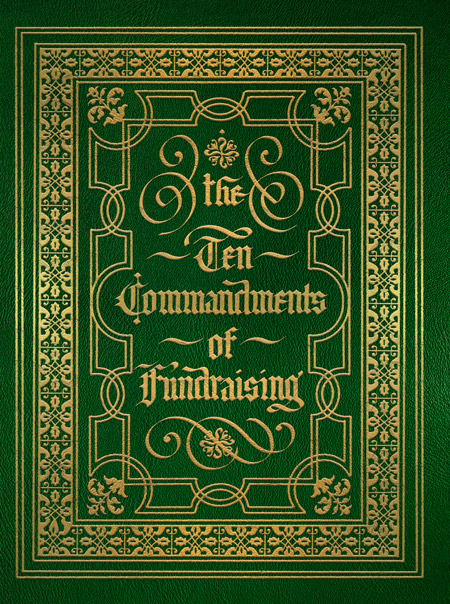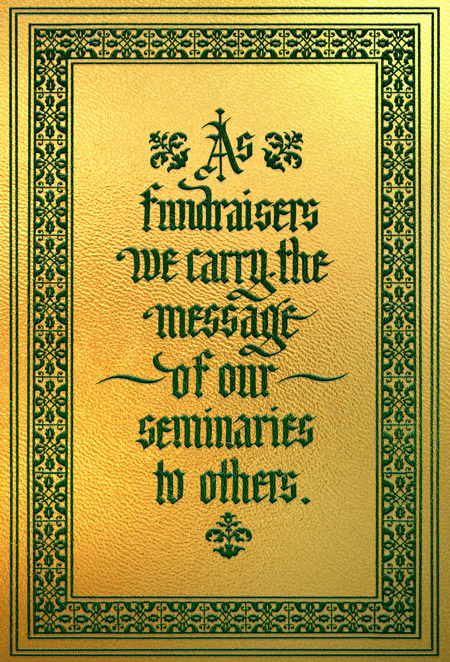
Illustrations by Jill Dehaan
As he approached the podium to deliver the keynote address to a roomful of chief development officers 30 years ago, it was evident why Dr. David Allen Hubbard had been chosen for the task. Nearing the end of his presidency at Fuller Theological Seminary, Hubbard had amassed an impressive list of accomplishments. Over three decades he had skillfully guided Fuller to become the world’s largest multidenominational seminary and a center for mainstream evangelical thought. He also had distinguished himself as a scholar, teacher, author, administrator, and fundraiser.

The year was 1993, and Hubbard was the keynote speaker at a symposium hosted by the Christian College Coalition (CCC) and sponsored by the Lilly Endowment. Hubbard’s topic of the day, “The Ten Commandments for Development Officers,” revealed a bit of Fuller’s secret sauce, but more importantly elevated the profession of fundraising in both unexpected and timeless ways. While no digital record of Hubbard’s keynote address exists, several written copies survived (thanks to Rebekah Burch Basinger, project director for the In Trust Center’s Wise Stewards Initiative) and serve as the basis for this review.
So why ten “commandments?” In a profession such as fundraising that is too often dominated by transactional techniques, Hubbard was convinced that a transformational approach was more faithful to the body image inherent in our shared callings to build Christ’s church. As an Old Testament scholar, he was aware that commandments have a timeless quality and power to them. They have always been true, far more so than mere tactics. And commandments are likely to persist as a reliable foundation for fundraising practice among people of faith.
One of the significant discoveries that Hubbard experienced as a seminary president was that fundraising at its core is deeply relational. To be successful, fundraising requires high integrity relationships with donors, colleagues, advisors, and ultimately God. This understanding is the connecting thread that weaves its way throughout Hubbard’s commandments.
Hubbard promoted the idea of mutual mentoring, or mentoring up and mentoring down, as key to establishing identity and relationship within the academy. It’s important for those in fundraising to be shaped by their leaders, but also to shape their leaders in return. A mentor can help answer key questions and interpret knowledge within the context of a particular organization. That information and mentoring relationship can help enlist the support of colleagues who might become collaborators.
There should be a theological basis for our understanding of who we are as fundraisers, and here is a place to begin to put theology to work. Too often we are inclined to be possessive about “our” donors and to take credit for the gifts “we” raise. Hubbard suggests we are wrong on both counts. He counsels us that as people of prayer, we need to ensure that God gets the credit first. As people who assist others with their stewardship of God’s resources the donor is honored second. Finally, as people who serve seminaries whose mission, vision and accomplishments have merited the support of others, we recognize our institutions third. We need to respond to the temptation of believing that we are in control by affirming that our joy as fundraisers is in having the privilege to participate in God’s work and with His people in the mysterious, wonder-filled process of transformation through philanthropy.

Maintaining close connections with our academic colleagues is key to accurately linking donors with the programs that align with their interests. To do this requires the discipline of meeting with and developing credibility with our fellow seminarians. Ideally, the fundraiser will play matchmaker, connecting donors outside of the organization with those on the inside who produce the outcomes that donors most value. The ability to succeed at making these vital connections is a collaborative process requiring sound listening skills, with both our colleagues and prospective supporters.
Relationship-focused fundraising also assumes a deep regard for relationships with the institution’s prospects and donors. Hubbard wrote about integrity that cares for other people. Listening is essential to understanding the possible points of connection between the donor’s heart and the heart of the institution. As people of integrity, we do not meet with donors to bend them to our wills, but rather to listen and learn about their dreams and desires. Our aim is always elevated when we understand and link the donors’ aspirations with an institution’s vision.
As fundraisers we carry the message of our seminaries to others. And these messages should always include a vision of hope. The invitation for the donor to participate is a recognition that to be realized, a vision for a different future based in hope must be a shared one. When fundraising is conducted in this way – by invitation to share in the work and the results – then power is dispersed. And when power is shared with others, the outcomes are co-owned. As co-owners they belong, and belonging is something to be desired. This lived reality of God doing “new things” among His people expresses the hope which inspires us in our seminary communities to always keep moving forward in faith and expectation.
Finally, the conviction that relationship building with donors is at the very core of fundraising has implications for how to assess operational performance. All too often our goals are skewed toward rewarding short-term needs at the expense of the long-term good. Unfortunately, this can result in the temptation to manipulate – to get the donor to do what we need now. And while that approach may win a modest gift for this year, it’s likely that the mutual joy of arriving at a transformative gift, a much more co-creative process, will remain elusive. Relational fundraising can happen quickly, but more often takes time. Investing the time to explore with the donor a mutually desirable pathway for philanthropy will ultimately be the most rewarding approach for both parties.
Even after 30 years, Hubbard’s ten commandments continue to offer reliable guidance for fundraisers in Christian institutions. Hubbard’s counsel about the importance of humility, integrity, collaboration, and relationships in fundraising have endured in their effectiveness. Some things just get better with time.
The Ten Commandments for Development Officers
By David Allen Hubbard
Thou shalt decide who thou art in professional identity.
Thou shalt not take credit for major gifts that come thy way.
Thou shalt err on the side of understatement in the claims for the institution.
Thou shalt not scatter thy energies or turn thy focus from God, family, and mission.
Thou shalt honor the wishes of donors.
Thou shalt not play lawyer, tax accountant, nor realtor for thy donors.
Thou shalt not ape the lifestyle of thy major donors.
Thou shalt form strong ties with academic leaders.
Thou shalt use restraint in academic decisions.
Thou shalt not be shortsighted in the tension between current needs and long-term goals.
A copy of Hubbard’s message is available,
click here.